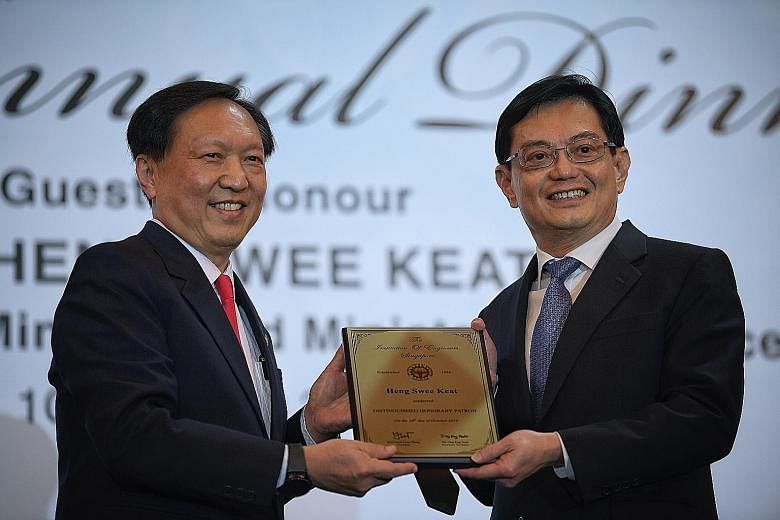Engineers have been instrumental in Singapore's security and success, and will play a key role in the future economy, developing solutions which can be exported to the world, said Deputy Prime Minister Heng Swee Keat.
The engineering community, working in concert with the Government, academia and industry, will also be needed to devise solutions to tackle the challenges of climate change, Mr Heng said yesterday.
Speaking at The Institution of Engineers, Singapore's (IES) 53rd annual dinner, he said the engineering community's pursuit of excellence and innovation is crucial as Singapore strives to be a "global-Asia node for technology, innovation and enterprise".
More engineers will be needed to design and implement innovative solutions to increasingly complex challenges. This will be in domains from advanced manufacturing, urban solutions and sustainability, to digitalisation and the service economy, to biomedical sciences and healthcare, said Mr Heng.
"Instead of buying solutions off the shelf, we need to develop the capabilities to engineer our own solutions, especially in key strategic areas. Like our water story, we can turn constraints into strengths," he told about 1,000 attendees gathered at the Shangri-La Hotel.
"As the saying goes, necessity is the mother of invention. If we succeed, we can export our solutions around the world," he added.
This is already happening. Solutions for urban farming and low-carbon buildings that have been designed locally can be useful to many other cities, he noted.
Mr Heng spelt out the role engineers have played in building Singapore's defence capabilities, securing a sustainable supply of water, and transforming the economy in sectors such as manufacturing and maritime.
With climate change, engineers will also be counted on to help in dealing with the threat of rising sea levels. "We will need to build up our coastal defences for critical segments such as Jurong Island and the area stretching from East Coast to the city. The Dutch-built dykes and polders... We should study the option and find solutions and adaptations that work for Singapore," he said.
Mr Heng also said Singapore will need to groom its engineers and leaders in the field for the future.
He commended the IES for its efforts such as the Global Engineers Leadership Programme. The latest is its IES Incubator and Accelerator programme, which was launched yesterday to help mentor engineers who want to be entrepreneurs and offer start-up funding.
He also highlighted the IES' collaboration with academia and government agencies to develop career progression frameworks, capability building programmes and industry technical standards.
Mr Heng said the IES is, for example, involved in developing a set of standards for railway systems, together with the Land Transport Authority, SMRT, SBS Transit and Enterprise Singapore.
The Government also set up a Public Sector Science and Technology Policy and Plans Office under the Prime Minister's Office last month to strengthen the public sector's science and technology capabilities, Mr Heng said.
At yesterday's dinner, Mr Heng was made an IES Distinguished Honorary Patron.
His strong support for science, technology, engineering and mathematics education during his time as education minister from 2011 to 2015, and his role as chairman of the Future Economy Council as well as the National Research Foundation were listed in his citation.
Mr Heng said he applied for a Public Service Commission (PSC) scholarship almost 40 years ago to study engineering. But the PSC told him there were too many students pursing engineering, but not enough in the humanities. So he was offered a PSC scholarship to study economics, which he took up. "That's why I said I was almost an engineer - as a teenage aspiration!" he added.


